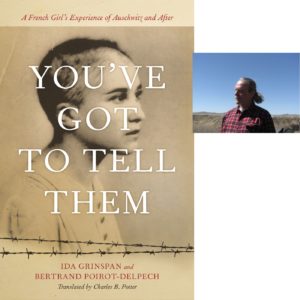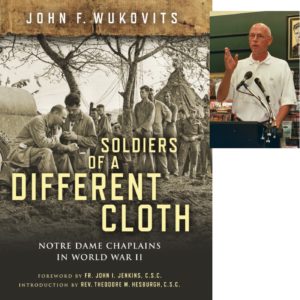Podcast: Play in new window | Download
Subscribe: RSS
 Charles Potter studied Medieval literature, worked in radio production and has recorded many audio books. When he retired to France to teach he came across a memoir about Auschwitz which he ended up translating. We spoke about the book.
Charles Potter studied Medieval literature, worked in radio production and has recorded many audio books. When he retired to France to teach he came across a memoir about Auschwitz which he ended up translating. We spoke about the book.
1:07 – Charles talks about how he got into translating this work. He was born during WWII. Two of his brothers served in the war. He studied Medieval Comparative Literature and then became a radio producer. Then he recorded many audio books.
4:00 – He moved to France during his retirement years and got to know France better. He eventually started teaching a class about how the French present WWII to themselves in movies, tv shows and other media.
6:30 – Charles talks about why the French are so fascinated by WWII.
17:34 – Charles talks about how the French depict the Resistance.
19:18 – Charles talks about French attitudes towards the film “Inglorious Basterds.”
23:01 – Charles talks about how he got into translating this book. His French wife was associated with the woman who wrote this memoir.
30:00 – The woman who wrote the memoir was from the countryside close to Paris.
32:41 – The French didn’t want to talk about their participation in the Holocaust. It wasn’t until the 1970s that things changed.
35:46 – We talk about slang used in the camps during WWII.
38:46 – Charles talks about life in the concentration camp.
42:00 – Charles talks about what she wrote about the camp’s liberation.
49:33 – Charles suggests the movie “Son of Saul” for anyone who wants to see life in these camps.
For more “Military History Inside Out” please follow me on Facebook at warscholar, on twitter at Warscholar, on youtube at warscholar1945 and on Instagram @crisalvarezswarscholar
Guests: Charles Potter
Host: Cris Alvarez
Tags: military, history, military history, conflict, war, interview, non-fiction book, world war two, WWII, France, germany, Auschwitz, concentration camp, memoir, slang, commando

 Martin Kirby and Margaret Baguley are two of three Australian academics who have been editing a new book exploring how war since 1914 has been represented in the arts in Australasia, the US, and in the British Isles. I spoke with Margaret and Martin about the book.
Martin Kirby and Margaret Baguley are two of three Australian academics who have been editing a new book exploring how war since 1914 has been represented in the arts in Australasia, the US, and in the British Isles. I spoke with Margaret and Martin about the book.